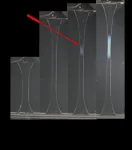(Press-News.org)
Insilico Medicine ("Insilico"), a clinical stage generative artificial intelligence (AI)-driven biotechnology company, today announced the publication of a novel series of orally available covalent CDK12/13 dual inhibitors, as a potential option against refractory and treatment-resistant cancers. Published in the Journal of Medicinal Chemistry (IF=7.2), the study showcases the discovery of compound 12b, a potent, selective, and safe therapy targeting CDK12/13, empowered by Insilico’s proprietary generative AI platforms including PandaOmics and Chemistry42.
As members of the cyclin-dependent kinases (CDK) family, CDK12 and CDK13 preferentially modulate DNA damage response (DDR) genes to maintain genomic stability, playing a significant role in tumorigenesis and the development of resistance to antitumor therapies. Despite the therapeutic promise, attempts to inhibit CDK12/13 have faced challenges such as toxicity and inefficacy stemming from issues with prior covalent and non-covalent inhibitors.
To start with, Insilico Medicine leveraged PandaOmics, its proprietary AI-powered target discovery and prioritization engine, to rank potential targets through multiomics and literature-based analyses, and CDK12 topped the list across datasets. Following that, the indication prioritization tools embedded in PandaOmics were utilized to reveal top priority indications for the selected targets, directing the research focus to cancer types including gastric cancer, ovarian cancer, prostate cancer, non-small cell lung cancer, liver cancer, triple-negative breast cancer (TNBC), and colorectal cancer.
Based on previous CDK12/13 inhibitors, Insilico research team used AI-guided structure-activity relationship (SAR) analyses and computational chemistry methods to produce a novel compound series with decreased unwanted off-target reactivity, improved oral bioavailability, and favorable inhibitory activity.
During the preclinical in vitro and in vivo testing, compound 12b demonstrated nanomolar potencies across cancer cell lines, desirable ADME properties. Furthermore, 12b exhibited significant efficacy in breast cancer and acute myeloid leukemia (AML) models, all without inducing intolerable side effects, paving the way for further therapeutic development.
"At Insilico Medicine, we hope to revolutionize the drug discovery process with cutting-edge artificial intelligence technologies, and the discovery of CDK12/13 dual inhibitors with potential to address treatment-resistant tumors is another step towards the promise," says Dr. Hongfu Lu, co-lead author of the study and Senior Director of Chemistry at Insilico Medicine. "The research and development process showcases how AI-guided drug design can achieve both precision and safety in cancer therapeutics, and we are striving to advance the compound in this program into clinical trials in the near future."
Reference
[1] Lu, H., Sun, D., Wang, Z., Cui, H., Min, L., Zhang, H., Zhang, Y., Wu, J., Cai, X., Ding, X., Zhang, M., Aliper, A., Ren, F., & Zhavoronkov, A. (2025). Design, synthesis, and biological evaluation of novel orally available covalent CDK12/13 dual inhibitors for the treatment of tumors. Journal of Medicinal Chemistry. https://doi.org/10.1021/acs.jmedchem.4c01616
About Insilico Medicine
Insilico Medicine, a global clinical stage biotechnology company powered by generative AI, is connecting biology, chemistry, medicine and science research using next-generation AI systems. The company has developed AI platforms that utilize deep generative models, reinforcement learning, transformers, and other modern machine learning techniques for novel target discovery and the generation of novel molecular structures with desired properties. Insilico Medicine is developing breakthrough solutions to discover and develop innovative drugs for cancer, fibrosis, central nervous system diseases, infectious diseases, autoimmune diseases, and aging-related diseases.
www.insilico.com
END
For decades researchers have been exploring how to store data in glass because of its potential to hold information for a long time — eons — without applying power. A special type of glass that changes color in different wavelengths of light, called photochromic glass, holds promise for stable, reusable data storage. Now, researchers have developed a doped photochromic glass that has the potential to store rewritable data indefinitely, according to research published in ACS Energy Letters.
Certain types of ...
Inspired by the humble deep-sea sponge, RMIT University engineers have developed a new material with remarkable compressive strength and stiffness that could improve architectural and product designs.
The double lattice design was inspired by the intricate skeleton of a deep-sea sponge known as Venus' flower basket, which lives in the Pacific Ocean.
Lead author of the latest RMIT study into the structure, Dr Jiaming Ma, said extensive testing and optimisation revealed the pattern's impressive combination of stiffness and strength, mixed with an ability to contract when compressed.
It’s this last aspect – known as auxetic behaviour – ...
While we are remarkably capable of generating our own goals, beginning with child’s play and continuing into adulthood, we don’t yet have computer models for understanding this human ability.
However, a team of New York University scientists has now created a computer model that can represent and generate human-like goals by learning from how people create games. The work, reported in the journal Nature Machine Intelligence, could lead to AI systems that better understand human intentions and more faithfully model ...
A pioneering study has revealed new insights into the role of gastric bacteria in stomach cancer development that could pave the way for a more effective treatment of pre-cancer according to a study published today in Helicobacter.
The Royal Society and Cancer Research UK-funded research led by Dr Amanda Rossiter-Pearson at the University of Birmingham identified a crucial interaction between Helicobacter pylori and non-H. pylori bacteria in the pre-cancerous stage of gastric cancer.
Gastric cancer is the fourth ...
Anemonefish, sometimes called clownfish, have been popular attractions in aquariums ever since Disney’s animated film Finding Nemo arrived in cinemas in 2003. Living symbiotically with sea anemones that shelter them from predators, the fish drive away organisms that nibble at their hosts. Anemonefish have also shown they will provide their hosts with the food given to them by humans, but does this happen in the wild?
An Osaka Metropolitan University Graduate School of Science team led by PhD student Yuya Kobayashi and Professor Satoshi Awata found evidence of this feeding behavior during field experiments. ...
A team of researchers from the University of Oxford, in collaboration with Thames Valley Police, the National Crime Agency, the John Radcliffe Hospital, Lurtis Ltd. and Cardiff University, has developed an advanced physics-based AI-driven tool to aid the forensic investigation of traumatic brain injuries (TBI).
The study, published today (26 Feb) in Communications Engineering, introduces a mechanics-informed machine learning framework to help police and forensic teams accurately predict TBI outcomes based on documented assault scenarios.
TBI is a critical public health issue, with severe and long-term neurological consequences. In forensic investigations, determining ...
CAMBRIDGE, MA -- About 60 percent of all cancer patients in the United States receive radiation therapy as part of their treatment. However, this radiation can have severe side effects that often end up being too difficult for patients to tolerate.
Drawing inspiration from a tiny organism that can withstand huge amounts of radiation, researchers at MIT, Brigham and Women’s Hospital, and the University of Iowa have developed a new strategy that may protect patients from this kind of damage. Their approach makes use of a protein from tardigrades, often also called “water bears,” which are usually less than a millimeter in ...
New double network hydrogel technology features automated self-strengthening that rapidly activates upon deformation of its polymer network.
Hydrogels are soft materials consisting of polymer networks and water. They are permeable to substances smaller than their network mesh size and have applications in biomaterials, contact lenses, soft robots, and more. At the molecular level, the cleavage of chemical bonds causes a material to become mechanically weaker and can lead to its destruction. Mechanochemically ...
The symptoms of schizophrenia vary greatly from person to person. A new study shows how these differences manifest themselves in the structure of the brain.
Schizophrenia is a complex mental health condition that affects perception, thought and emotions. This complexity is reflected in the individual manifestations of the disease: for some patients, perceptual disturbances are the main problem, while for others, cognitive impairments are more prevalent. “In this sense, there is not one schizophrenia, but many, each with different neurobiological profiles,” says Wolfgang Omlor, first author of the study and senior physician at the University Hospital of Psychiatry ...
Continuous Glucose Monitors (CGMs) are growing in popularity but new peer-reviewed research, published in The American Journal of Clinical Nutrition, from the University of Bath, suggests they may not be as accurate as many believe. Originally designed to help people living with diabetes manage their blood sugar, these devices are now being used by the health-conscious to track how different foods affect their glucose levels.
The study, from the University’s Centre for Nutrition, Exercise ...



